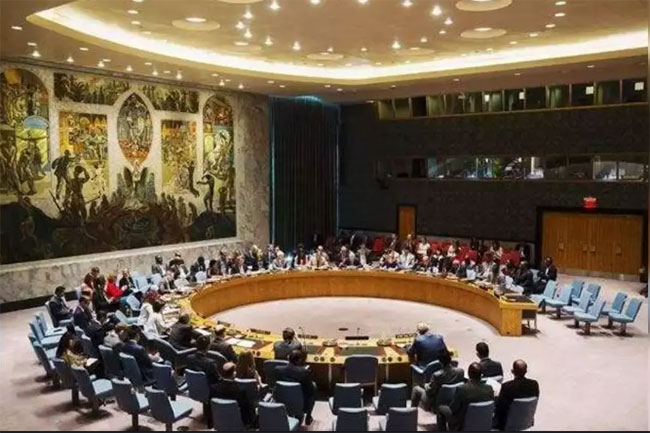India was elected as non-permanent member of the powerful United Nations Security Council for a two-year term on June 17, winning 184 votes in the 193-member General Assembly.
Along with India, Ireland, Mexico and Norway also won the Security Council elections held on June 17.
There were 192 Member States present for voting and the 2/3 required majority was 128. India garnered 184 votes. Canada lost the elections.
Member States elect India to the non-permanent seat of the Security Council for the term 2021-22 with overwhelming support. India gets 184 out of the 192 valid votes polled, India’s Permanent Mission to the U.N. tweeted.
India will sit in the most powerful U.N. organ, for two years beginning on January 1, along with the five permanent members China, France, Russia, the U.K. and the U.S. as well as non-permanent members Estonia, Niger, Saint Vincent and the Grenadines, Tunisia and Vietnam.
India was a candidate for a non-permanent seat from the Asia-Pacific category for the 2021-22 term. Its victory was a given since it was the sole candidate vying for the lone seat from the grouping.
New Delhi’s candidature was unanimously endorsed by the 55-member Asia-Pacific grouping, including China and Pakistan, in June last year.
Previously, India has been elected as a non-permanent member of the Council for the years 1950-1951, 1967-1968, 1972-1973, 1977-1978, 1984-1985, 1991-1992 and most recently in 2011-2012.
The U.N. General Assembly on June 17 conducted elections for President of the 75th session of the Assembly, five non-permanent members of the Security Council and members of the Economic and Social Council under special voting arrangements put in place here due to COVID-19 related restrictions.
Turkish diplomat and politician Volkan Bozkir was elected as President of the 75th session of the U.N. General Assembly. He was the endorsed candidate from among the Western European and other States.
The elections began at 9 a.m. on June 17 and unlike previous years, when the sprawling General Assembly hall would be packed with U.N. envoys, diplomats and staff during the ballot, this year presence in the UNGA hall was sparse due to COVID-19 related restrictions.
U.N. diplomats, staff and other personnel arrived at the General Assembly hall wearing masks and immediately left the venue after casting their ballots.
In adherence to social distancing guidelines due to the coronavirus pandemic, the 193 U.N. Member States were allotted different time slots to cast their votes in the General Assembly Hall for the crucial elections.
Eight time slots were allocated to Member States to cast their ballots starting at 9 a.m., in adherence to social distancing guidelines. The voting continued well in the afternoon, with an additional 30 minute time slot for voters who were unable to visit the General Assembly hall during the specific time slot communicated to them. The time slot for India to cast its ballot was 11:30 a.m.-12 noon.
President of the U.N. General Assembly Tijjani Muhammad-Bande oversaw the proceedings in the General Assembly Hall and the tellers also observed the whole process.
For the two vacant seats from among the African and Asia-Pacific States, Djibouti, India and Kenya were the three candidates. For the one vacant seat from among the Latin American and Caribbean States, one endorsed candidate was Mexico. For the two vacant seats from among the Western European and other States, Canada, Ireland and Norway were the three candidates.
The 15-member Security Council has five permanent members — the U.S., the U.K., France, Russia and China — and 10 non-permanent.
Each year the General Assembly elects five non-permanent members for a two-year term. The 10 non-permanent seats are distributed on a regional basis as follows: five for African and Asian States; one for Eastern European States; two for the Latin American and Caribbean States; and two for Western European and other States. To be elected to the Council, candidate countries need a two-thirds majority of ballots of Member States that are present and voting in the Assembly.
India received overwhelming support in its election to the UN Security Council and it will continue to provide leadership and a new orientation for a reformed multilateral system, India’s Permanent Representative to the U.N. Ambassador T.S. Tirumurti said.
“I am truly delighted that India has been elected as a non-permanent member of the United Nations Security Council for 2021-22. We have received overwhelming support and I’m deeply humbled by the tremendous confidence which the member states of the United Nations have reposed in India,” Mr. Tirumurti said in a video message after the election results were announced.
Source: PTI











